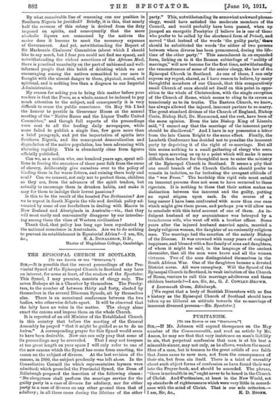THE EPISCOPAL CHURCH IN SCOTLAND.
[TO TR& EDIT011 03. THE "SPZCTiT011,."[ SIR,—It is possible that the recent proceedings of the Pro- vincial Synod of the Episcopal Church in Scotland may have an interest, for some at least, of the readers of the Spectator. This Synod, I may premise, consists of clergy only. The seven Bishops sit in a Chamber by themselves. The Presby- ters, to the number of between thirty and forty, elected by themselves in the several Diocesan Synods, sit by themselves also. There is an occasional conference between the two bodies, who otherwise debate apart. It will be observed that the laity have no voice in the matter. The clergy alone enact the canons and impose them on the whole Church.
It is reported of an old Minister of the Established Church in this country that before the meeting of the General Assembly he prayed "that it might be guided so as to do no hatpin." A corresponding prayer for this Synod would seem to have been desirable. Now one can only pray that some of its proceedings may be overruled. That I may not trespass at too great length on your space I will only refer to one of the new canons which the Synod has come from enacting, the canon on the subject of divorce. At the last revision of the canons, in 1890, the subject prudently was left alone. In the Consultative Council (to which representative laymen were admitted) which preceded the Provincial Synod, the Dean of Edinburgh proposed the insertion of the following clause : "No clergyman shall perform the marriage service for the guilty party in a case of divorce for adultery, nor for either party in a case of divorce on any other ground than that of adultery ; in all these cases during the lifetime of the other
party," This, notwithstanding its somewhat awkward phrase- ology, would have satisfied the moderate members of the Council, and would probably have been passed, when up jumped an energetic Presbyter (I believe he is one of those who prefer to be called by the shortened form of Priest), and moved "that instead of the words the guilty party,' there should be substituted the words for either of two persons between whom divorce has been pronounced, during the life- time of the other party." This amendment in an expanded form, linking on to it the Roman subterfuge of "nullity of marriage," will now become for the first time, notwithstanding the remonstrances of some of the senior clergy, the law of the Episcopal Church in Scotland. As one of these, I can only express my regret, shared, as I have reason to believe, by many thoughtful members of our Church, that this comparatively small Church of ours _should set itself on this point in oppo- sition to the whole of Christendom, with the single exception of the Church of Rome, which seems to cling to its errors as tenaciously as to its truths. The Eastern Church, we know, has always allowed the injured, innocent partner to re-marry. The great standard divines of the Church of England, Bishop Cosin, Bishop Hall, Dr. Hammond, and the rest, have been of the same opinion. Even the late Bishop King of Lincoln said, "I cannot say that the marriage of the innocent party should be disallowed." And I have in my possession a letter from the late Canon Bright to the same effect. Finally, the Lambeth Conference has decided not to penalize the innocent party by depriving it of the right of re-marriage. But all this seems nothing to a small gathering of clergy who seem bent upon screwing us up to a point which will make it more difficult than before for thoughtful men to enter the ministry of the Episcopal Church in Scotland. It seems a pity that one small branch of the Church Catholic should prefer to remain in isolation, so far imitating the arrogant attitude of the "wee Frees." The hardship this rigid rule must entail on innocent persons does not seem to have occurred to these rigorists. It is nothing to these that their action makes no distinction between the innocent and the guilty, putting an equal stigma upon each. In the course of a long career I have been confronted with more than one case which might give them pause, and perhaps you will allow me to conclude with this brief account of one of them. An in- dulgent husband of my acquaintance was betrayed by a. treacherous wife, who went of with a brother officer. Some years after the injured husband married again, married a. deeply religious woman, the daughter of an eminently religious man. The marriage bad the sanction of the saintly Bishop of the Diocese. It was crowned with many years of conjugal happiness, and blessed with a fine family of sons and daughters, of whom it might be said, in the language of the ancient chronicler, that all the men were brave and all the women virtuous. Two of the sons distinguished themselves in the South African War. One of the daughters became a devoted District nurse. All were exemplary. Will the Synod of the Episcopal Church in Scotland, in weak imitation of the Church of Rome, venture to call this marriage adulterous and these
[We regret that a body of Scottish Dissenters with so fine a history as the Episcopal Church of Scotland should have taken up so illiberal an attitude towards the re-marriage of innocent divorced persons.—ED. Spectator.]










































 Previous page
Previous page